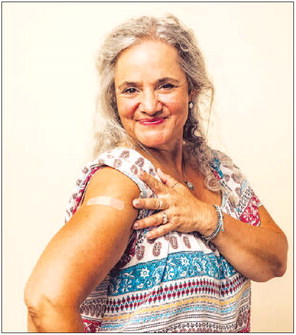Getting a COVID shot is not the end of precautions


by Patty Marsters
pattym@lwsb.com
Before life can return to the normalcy we remember of 2019, we need to reach herd immunity. Herd immunity occurs when enough people become immune to a disease to make its spread unlikely. As a result, the entire community is protected, even those who are not themselves immune. With COVID-19, herd immunity can be achieved through vaccination, and even though anyone 16 and older who wants to be vaccinated can now do so, it will still take time. Plus, no vaccine has yet been approved for a large part of the global population, children 15 and younger. So estimates for when we will reach herd immunity range from late summer to early 2022.
Even those who are fully vaccinated (people who are 14 days or more past the last dose) need to be cautious. Getting COVID-19 is still possible. In clinical trials, the Pfizer-BioNTech (administered at Leisure World’s vaccine clinics) and Moderna COVID-19 vaccines were about 95 percent effective in preventing symptomatic COVID-19 after two doses, and the single-dose Johnson & Johnson vaccine was found to be between 66.1-72 percent effective. Though these vaccines are highly effective against severe disease and death from the virus, there’s a chance you could get infected— and that you can infect others, who can then infect other people.
The Centers for Disease Control and Prevention (CDC) and other health experts recommend you keep wearing a mask and maintaining physical distance to help slow the spread of COVID19 until we can reach herd immunity. This is especially important when you are in any public place.
But you can feel safe visiting with family and friends. According to the CDC, fully vaccinated people can gather indoors in small groups with other fully vaccinated people without masks or physical distancing with unvaccinated people who aren’t at high risk.
If you put off routine medical care such as dental checkups and visits to the optometrist until you felt safer or were vaccinated, it’s okay to start making those appointments. Stop putting off that colonoscopy or elective surgery. “Being vaccinated, now is the safest it has been to have surgery in well over a year,” says Beverly Philip, M.D., president of the American Society of Anesthesiologists. However, you may want to hold off on getting a mammogram until four to six weeks after you are fully vaccinated. Many women develop swelling in the lymph nodes in their underarm after vaccination, the CDC says, and while that swelling is a normal sign that your body is building protection to the coronavirus, it could cause a false mammogram reading.
As more things open and we get closer to herd immunity, keep your vaccine card handy. Researchers from Pfizer and its German partner, BioNTech, are studying how long the vaccines’ protective immunity will last. According to Pfizer CEO Albert Bourla, people are likely to need a third dose of a COVID-19 vaccine within a year of getting fully vaccinated, and they may subsequently need annual shots to protect against the virus and its variants. Your vaccine card will help confirm which vaccine you received and when you received it in the event that you need a booster.





